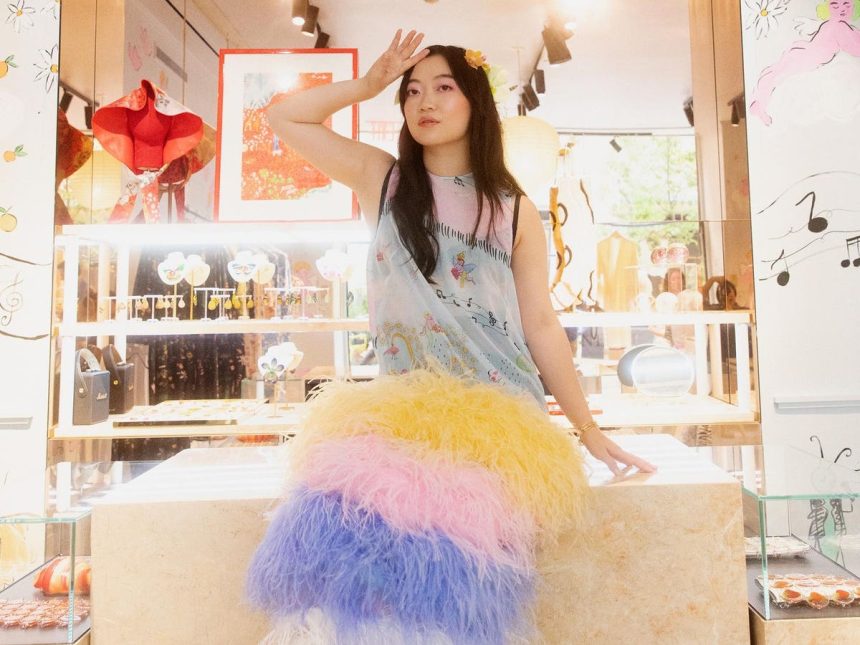Think this is nice? It’s a version of the weekly Under 30 newsletter and would be even better in your inbox.
Olivia Cheng isn’t obsessed with labels, even if the label is something positive like “sustainable.”
“I’m more interested in telling a story, a very fantastical story, and hopefully helping people to think about one small change they can make in their life,” says Cheng, the founder of upcycled fashion brand Dauphinette. “It’s not necessarily about doing things that will make you feel more sustainable. It’s about doing things that are great and that you enjoy and that are weird and wonderful, [that are] also better for the environment.”
So Cheng, who made the 2023 Forbes 30 Under 30 Art & Style list, launched Dauphinette in 2018 with just $2,000 and a line of upcycled vintage coats. Five years later, she’s showing her expanded collection at New York Fashion Week on September 9—her third time exhibiting at the fall event.
Cheng still sells upcycled, repurposed and hand painted outerwear, but has also expanded to sell jewelry, ready-to-wear clothing and accessories like handbags and belts. She uses compostable and recyclable packaging for all orders. And much of her work includes natural elements like preserved flowers and fruits—a trend that not only showcases Dauphinette’s sustainable practices, but also led the company to profitability in 2020.
Last year, Cheng told Forbes Dauphinette was on track to hit $1 million in 2022 revenue. Cheng declined to comment on the brand’s finances when we spoke this month. Cheng did, however, share that the brand is not profitable at this time.
After Cheng’s fruit-preserved jewelry helped sales skyrocket, her production costs increased to meet the demand, she said. That’s why her biggest advice for young founders is to be weary of early success.
“I see founders who have a hit product and they think that this product is going to take them to the moon, but everybody who goes to the moon usually has to come back,” Cheng says.
Even with fluctuating financial success, Cheng continues to hit major fashion milestones: In addition to her shows at New York Fashion Week, she’s had garments on display at the Metropolitan Museum of Art’s Met Gala “Made In America” exhibit from September 2021 through September 2022.
Until next week,
P.S. Everyone give a warm welcome to Melanie Weintraub, our new Under 30 Community Manager! Have ideas about the future of the U30 community? You can reach Melanie at [email protected].
Meet The Entrepreneur With A Plan To Create One Million Black Businesses By 2030
Shopify cofounder and billionaire Tobi Lütke and nonprofit founder John Hope Bryant are teaming up to create a world where anyone with a business idea could start it without barriers. Here’s more on their mission to level the playing field for Black founders.
On Our Radars
-If all of your friends jumped into investing, would you do it too? Some 41% of Gen Z investors in the U.S. and Canada say financial FOMO is leading them to invest. Whether it be peer pressure or a newfound interest in the market, Gen Z is starting to diversify their portfolios at higher rates than other generations. (Fortune)
-After the Supreme Court struck down affirmative action in June, it caused a surge in discussion surrounding legacy admissions. After all, when children of alumni or wealthy donors are given preferential consideration in college acceptances (which happens at as much as 80% of America’s top universities), it can perpetuate issues like the lack of diversity of background, race and socioeconomic status of admissions classes. (Forbes)
–Is a simple T-shirt a viable business plan? The founders of clothing company Buck Mason seem to think so. Every year, 500,000 Buck Mason tees are produced. The shirts, which start at $45 a pop, result in 30% of the brand’s total annual sales. Last December, the company bought a sewing factory and cloth mill in Pennsylvania, touting its domestic manufacturing. (New York Times)
Venture View
Time to take a look inside the world of venture capital.
This week, I sat down with 2022 Under 30 Europe lister Richard Hadler about a new investment syndicate he and Hugo Tilmough, a 2019 Under 30 Europe lister, launched. The syndicate, called Founders Capital, is inviting founders to participate in investment rounds with contributions as low as $1,200. Hadler, who initially made the list due to his work as the CEO of a B2B marketing agency alan.Agency, now splits his time between working as a director at an investment platform called Odin and investing in multiple startups. We spoke about up-and-coming industries, investment opportunities and advice for founders looking to raise.
The following responses have been slightly edited for length and clarity.
What are some of the biggest trends you’re noticing in the investment industry? There’s been a lot of hype around AI, but there’s also a lot of scrutiny around what AI is. I think people are reluctant now to jump into AI because they’ve heard of the bad press stories of people just building stuff on borrowed ground.
From an investor’s perspective, what makes a successful company? The successful companies that we see are the ones that spend a lot of time on their data and can answer questions quickly and properly.
But it’s also those who understand why they’re getting investment and the amount of investment they actually need.
Not every business is going to get to profitability really quickly. So I think the key isn’t to show me how you’re going to get to profitability tomorrow or next week. It’s to show me a clear rationale as to why you are asking for what you are asking for, and how that impacts your potential to reach profitability in the future.
Which industries do you see the most growth in right now? Everyone wants to invest in impact, but I think we’ve got to be quite careful as to what we mean by impact, sustainability, et cetera.
I also think health tech is a very interesting space; it seems to be very buoyant.
And I think anything in food and agriculture is huge at the moment. Obviously people are looking for ways to change the way in which we understand and grow food, but also handle the limited resources we have on the planet.
What is your best piece of advice for young founders today? First, forget being a unicorn. You can’t set out to be a unicorn. Investors don’t want to hear that anymore. They want you to set out to say, “We are going to be a resilient business.”
For every pound [or dollar] that you are spending, critically evaluate whether it’s making you a more resilient business. What I mean by resilient is are you building a backbone that gets stronger by the week to withstand the issues like Covid or market conditions?
Read the full article here






